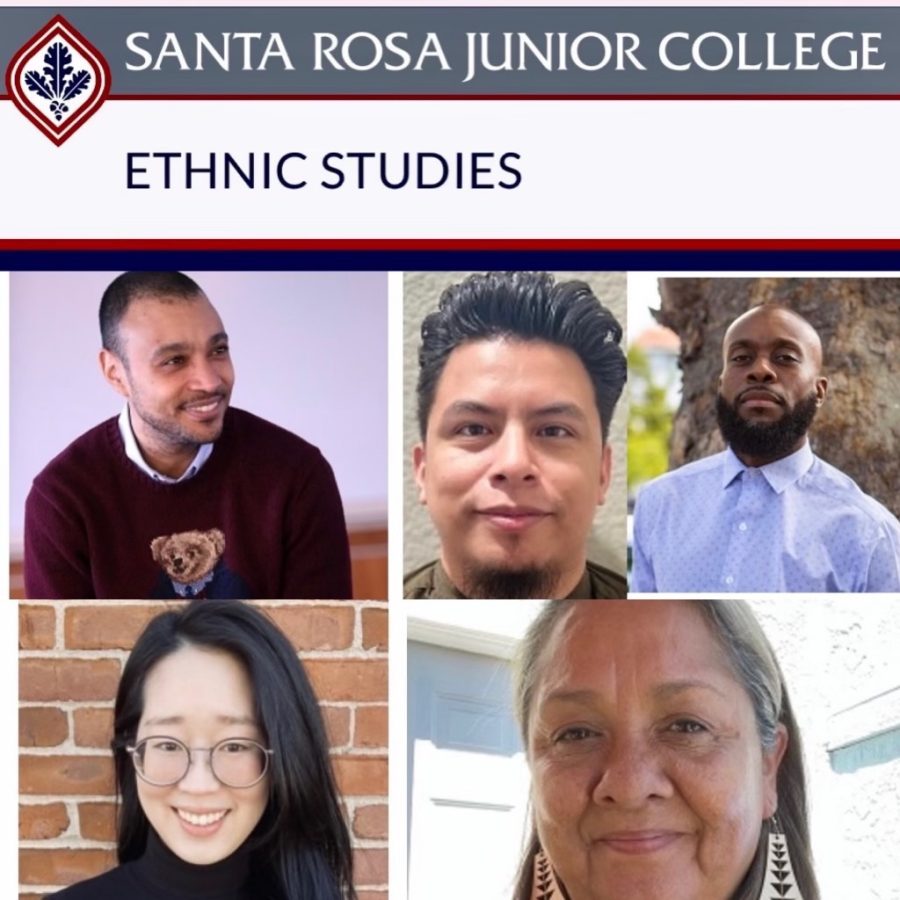Santa Rosa Junior College implemented a new Ethnic Studies Department this Fall that features five new full-time faculty and five introductory courses in Native American, Asian American, Chicanx and Latinx, African American studies and ethnic studies.
The department has been two years in the making, since July 2020, when the Academic Senate endorsed the creation of a Black Studies major as the first component of an SRJC ethnic studies program and established an ad hoc task force to start planning the program.
“It was hard but beautiful work seeing these things come together, meeting timelines, getting in the books and now offering this very relevant coursework for our students,” said Robert Holcomb, dean of the new department.
Holcomb said the Ethnic Studies Task Force made recommendations and developed the new department and coursework in one year, an ambitious timeline.
“There’s an easy way to do it and a thorough way. The easy way would be to take existing courses and tweak them, and then submit for approval and change nothing else. You don’t hire new instructors or have a new department,” Holcomb said. But the Ethnic Studies Task Force didn’t take the easy way out.
There was not only a moral imperative to diversify and enhance SRJC’s curriculum, he said, but also a new California State University system requirement for ethnic studies. The law, AB 1460, requires CSU students graduating in 2024-25 and beyond to take at least one three-unit course in ethnic studies to earn their diploma.
Holcomb has no doubt the ethnic studies classes will fill, either because of the CSU requirement or student interest, but enrollment is currently low. He said curriculum committees at the state level only approved the JC’s ethnic studies courses for CSU transfer a month before the semester began, which made it difficult for counselors to encourage enrollment. Holcomb believes all 25 proposed courses will be full one year from now, and then the department can start implementing the more in-depth courses outlined in the 2022-2023 SRJC ethnic studies course catalog.
“The next phase would be to develop courses beyond just the intro courses,” Holcomb said. “Now that we have the full time faculty members on board, we have expertise and they can write more specialized courses.”
Holcomb said SRJC is addressing the historical inequality of its traditionally Eurocentric curriculum.
“My mother is from Northern Mexico,” Holcomb said. “Growing up I didn’t always have the opportunities to learn about the Mexican American experience, but when I did, it was super empowering. I also have benefited greatly when I’ve had opportunities to learn about African American, Asian American and Native American authors and scientists.”
The ethnic studies department will provide opportunities for student employment, such as student tutors, he said. It may also allow for hiring of Black therapists and Latinx financial aid advisors who can address students’ needs in culturally responsive ways.
Stephanie Chang, Introduction to Ethnic Studies and Introduction to Asian American Studies instructor, is working on her doctorate in gender studies at UCLA, where she received a master’s degree in Asian American studies.
Chang’s teaching style is rooted in her experience as an Asian American feminist, a lived experience she hopes will influence the campus community.
“Something that I think is important to ethnic studies is the idea of a political coalition, to work with different communities together to build a racially just environment,” she said. “I like the idea of speaking to everybody’s experiences to create these spaces.”
Chang came to SRJC because she believed in the vision of community colleges and in helping students overcome barriers to entry while envisioning a different future.
“I’d love to have more community-based classes, where students can work with bigger community organizations beyond SRJC, and how to work together to uplift Santa Rosa and the community college,” Chang said.
Chang said she was excited at how motivated SRJC students were to create an ethnic studies department and to be in Northern California where strikes and protests for ethnic studies curriculum began. The first ethnic studies program was implemented at San Francisco State in 1969.
SRJC hired Chang as an Asian American specialist, but she wants to expand her focus. As a doctoral candidate, Chang became interested in horror films, and she hopes to teach a class on that genre in the future.
Moises Santos, instructor of Chicanx and Latinx studies, came to SRJC after receiving his doctorate in history from University of New Mexico and teaching courses in history and Chicano and Chicana studies at Central New Mexico Community College. Like Chang, Santos plans to expand SRJC’s course offering into his area of expertise, which includes Chicanx and Latinx history of education and politics, and transnational networks among people in the U.S. and Latin America.
“I come from a tradition of working in ethnic studies where everybody’s involved — students, community and faculty, people in and out of the institution,” Santos said. “There’s a lot of immigrant communities in Santa Rosa who are students at SRJC, so I’m looking forward to developing the curriculum with them.”
SRJC President Dr. Frank Chong said he’s thrilled to be at SRJC for the beginning of the ethnic studies department. He majored in ethnic studies as an undergrad at the University of California, Berkeley, and in 1985, he started the Violence Against Asians Task Force in Oakland to stop violence against Loatian families.
As a Chinese-American, Chong is concerned about the recent increase in violence against Asian-Americans. He said one of the best ways to combat racial hatred is through educating ourselves about other ethnicities through classes like those found in the ethnic studies program.
“White students need to take ethnic studies as much as people of their own ethnicity.Latinos need to learn more about Asians and Asians need to learn about Blacks and so on,” Chong said. “We need to know more about our commonalities rather than our differences.”
For more information on the ethnic studies department, lecture series and faculty, visit the SRJC Ethnic Studies webpage.




